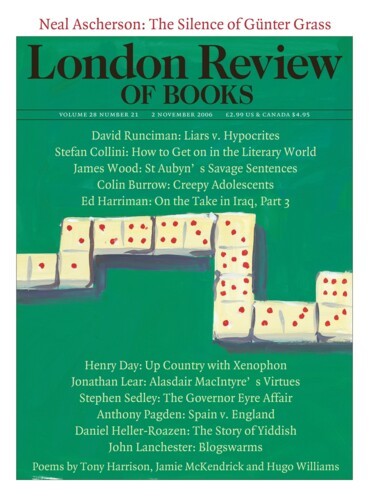In the Sunday Times of 1 October, the home secretary was reported as having it in mind to ‘strip some terror suspects of the automatic right to be protected from torture’, should ministers rule that there were ‘overriding considerations of national security’. Knowing as we do that ‘overriding’ here means that considerations so labelled cannot on security grounds be shared with the public – or even, given Blair’s record in these matters, with other members of the government – we have good reason to see this quite dreadful prospect or else intention as fresh evidence that in its own mind the administration is now answerable to nobody at all. Only in his dreams could John Reid imagine that the changes that would be required to the present more than adequate anti-terrorist laws to enable the Home Office’s hitherto frustrated torturers to be let loose on selected inmates of Abu Belmarsh, could be got through the House of Commons, let alone the Lords. But how depressing that he should first have let it be known at the recent Labour Party Conference how far he was ready to go to protect ‘the rights, life and limb [sic] of the British people’, as if that was just the sort of tabloid rant that those members of his shrinking – and who’s to wonder? – party who still have the stomach for that event wanted to hear. Odd in the circumstances that the party flew Bill Clinton over to address it when they should clearly have had Al Gonzales, the creepily evasive successor to John Ashcroft as George W.’s attorney-general, who in the celebrated ‘Bybee memo’ four years ago suggested that an American president, aka the commander-in-chief, might have the power to ‘override’ (again) the constitution in permitting terrorist suspects to be put to the question.
Music to John Reid’s ears that would have been. Reid’s ambition may well be to establish himself as New Labour’s most illiberal home secretary yet. Such an aspiration means of course having to out-Blunkett Blunkett, and that is a stiff call. Reid no doubt knew when he spoke in Manchester that his predecessor was on the point of publishing his political memoirs, so that there was a risk of being upstaged. The memoirs are now indeed with us, and an obese volume they make, all but 900 pages long. They record in numbing particularity David Blunkett’s years in office, from May 1997, when he joined the Cabinet as secretary of state for education, to his final enforced resignation at the end of last year. The Blunkett Tapes (Bloomsbury, £25) is a title which, Watergate instantly leaping to mind, might arouse hopes that the contents are what you might call intercept evidence, tapes recorded sub rosa by the sort of hidden surveillance machinery the use of which Blunkett was so keen to expand in the criminal justice system. But no, sadly, everything in this diary-cum-apologia is above board, being his reflections on events taped day in, day out, with now and again a few italicised paragraphs by way of a retrospective gloss. They make for dour reading.
Somewhere among them, it’s possible that Blunkett’s wishful thoughts on the legalisation of torture may be found; but short of an entry in the index under the heading of ‘torture’, to locate them would be a labour for which even their discovery would be an insufficient compensation. What’s there in plenty at least is the testimony you’d expect to how unfailingly intolerant he was of all those, in the Civil Service, the media and the judiciary, who took a softer line than he did in respect of asylum seekers, immigrants in general and counter-terrorism. Even in the few days since the Tapes was published, one of those who proved far too reasonable to toe Blunkett’s line, Martin Narey, the then head of the prison service, has gone on record correcting the account given of the Lincoln prison riot in October 2002. Narey reveals that Blunkett phoned him late at night and told him to call in the army and ‘machine-gun’ the rioters, that ‘he didn’t care about lives.’ That someone able to react in those hysterical terms to a disturbance threatening to no one’s life or limb outside the jail itself should have also been able to continue in office, or invited to hold it in the first place is truly alarming. Yet Blunkett’s state of mind on that occasion is one we have grown used to among the security forces whenever they have reason to suppose that terrorism is afoot – as when an air exclusion zone was reportedly ordered above a terrace house in East London where two young Muslims turned out to have been planning nothing at all, or in February 2003, when SAS men and armoured personnel carriers staked out Heathrow, in answer to a threat which, if it even existed, was obviously ‘aspirational, not operational’, to use a neat distinction made the other day in the US by a security high-up. Blunkett now tells us that he regretted the over-reaction at the airport, on the grounds that it ‘frightened people to death, particularly women’, which doesn’t quite strike the note of gallantry it might have done fifty years ago. But thanks to the microclimate of panic in which first David Blunkett, and now John Reid, have found it suits them very nicely to breathe, our fears in respect of terrorism are directed, not at the threats we can’t see but at those we can, of a regime apparently set on becoming more repressive parliament by parliament.
Send Letters To:
The Editor
London Review of Books,
28 Little Russell Street
London, WC1A 2HN
letters@lrb.co.uk
Please include name, address, and a telephone number.

